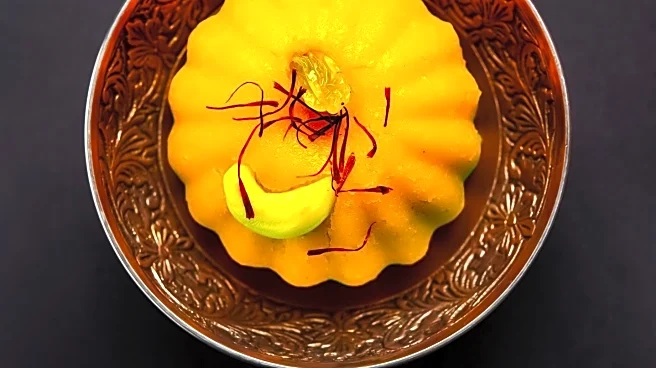What's Happening?
Chef Christian Irabién, at Amparo Fondita in Washington, D.C., is pioneering the use of insects as a primary ingredient in his culinary creations. This contemporary Mexican restaurant is exploring the potential of insect-based dishes as a sustainable protein source. The initiative reflects a growing interest in alternative proteins amid global climate shifts and food security concerns. Irabién's approach aligns with a broader movement towards environmentally friendly and resource-efficient food production methods. The restaurant's menu features a variety of insect-based dishes, aiming to challenge traditional perceptions of food and introduce diners to new flavors and textures.
Why It's Important?
The use of insects as a protein source is gaining attention as a sustainable alternative to traditional livestock. Insects require significantly less land, water, and feed compared to conventional meat sources, making them an environmentally friendly option. As climate change impacts food production and resources become scarcer, alternative proteins like insects could play a crucial role in ensuring food security. This shift could also influence public policy and industry standards, encouraging more sustainable practices in food production. The success of such initiatives could lead to broader acceptance and integration of insect-based foods in mainstream diets, potentially reducing the environmental footprint of food consumption.
What's Next?
If the trend of insect-based cuisine continues to gain popularity, it could lead to increased investment in insect farming and processing technologies. This might also prompt regulatory bodies to establish guidelines and standards for insect-based food products. As consumer interest grows, other restaurants and food companies may explore similar innovations, potentially leading to a more diverse and sustainable food market. Additionally, educational campaigns could be launched to inform the public about the benefits and safety of consuming insect-based foods, further driving acceptance and demand.
Beyond the Headlines
The cultural acceptance of insect-based foods varies globally, with some regions already incorporating insects into traditional diets. In the U.S., overcoming the 'yuck factor' associated with eating insects is a significant challenge. However, as awareness of environmental issues and sustainable practices increases, cultural perceptions may shift. This could lead to a broader acceptance of insects as a viable food source, influencing culinary trends and dietary habits. The ethical implications of insect consumption, including animal welfare considerations, may also become a topic of discussion as the industry evolves.










